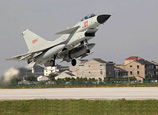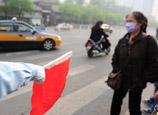
Chinese and Indian border troops have made positive developments in a three-week border standoff, and both have simultaneously withdrawn from the western section of the border.
Time: The occurrence of the incident is on April 15.
Area: the Tiannan River Valley area
Reason:
India: Tensions flared between the two neighbors after Indian media claimed that Chinese defense troops "trespassed on Indian territory" in the western sector of the disputed border area in mid-April.
China: Beijing has disputed the charge, saying that Chinese border defense troops, committed to safeguarding peace and tranquility in the border area, did not cross the Line of Actual Control. (Source: China Daily)
Spokeswoman: Hua Chunying
China, India end border standoff
"China and India have reached an agreement on resolving the incident in the western section of the border. The frontier forces of the two countries have terminated the standoff at the Tiannan River Valley area," Hua Chunying said in a statement. (Source: Xinhua)
"China and India should work jointly to achieve a fair and reasonable border treaty that is accepted by both sides," she said. (Source: China Daily)
Comments: Fu Xiaoqiang, Pei Yuanying, Swaran Singh, Han Hua
Fu Xiaoqiang, a researcher from the China Institutes of Contemporary International Relations, told the Global Times though it took a relatively long period to resolve the standoff, and it showed that the two sides have the capability to handle border disputes. (Source: Global Times)
Pei Yuanying, a former Chinese ambassador to India, said recently that resolving the Sino-Indian border dispute, an issue left over by history, needs time and patience.
"Border standoffs are somewhat inevitable in the future, but they are only petty issues against the whole backdrop of thriving Sino-Indian relations," Pei said, adding that the point is acknowledged by both sides. (Source: China Daily)
Swaran Singh, a professor from the School of International Studies at Jawaharlal Nehru University, told the Global Times both sides behaved maturely in resolving the issue.(Source: Global Times)
Han Hua, director of the Center for Arms Control and Disarmament at the School of International Studies affiliated with Peking University, told the Global Times Monday that the withdrawal came as no surprise, noting that both New Delhi and Beijing are rational when handling bilateral disputes despite constant hyping of tensions by media.
According to Han, bilateral ties were tense from 2006 to 2009 due to rows over the eastern section of the China-Indian border, but have warmed up since 2010, partly because of rising disputes with China's neighbors to the east as a result of the US pivot to Asia.
"Last fall's leadership transition in China was another turning point. The new leadership adjusted its policies and now seeks a stabilized relationship with India," Han said. "The grand strategy of China is to avoid troubled relations with its neighbors. Given current rows with Japan over the Diaoyu Islands, there is no reason to start another row."
"As emerging powers, the two countries both face pressures from the West, and have the will to cooperate on a wide range of global issues. They both want stability and prioritize economic development, so they don't want to clash with each other," Han said. (Source: Global Times)
Activities in May:
India: On Monday, the Indian Foreign Ministry confirmed that Foreign Minister Salman Khurshid will come to Beijing as scheduled in this week, where he will "discuss bilateral, regional and global issues of concern" with his Chinese counterpart, a spokesman was quoted by AFP as saying.
China: Premier Li Keqiang will also conduct a planned visit to New Delhi later this month. (Source: China Daily)
















 Fishing fleet sets sail for Nansha Islands
Fishing fleet sets sail for Nansha Islands


![]()
